|
FIAT Croma
Debut: 2005
Maker: FIAT
Predecessor: no |
|
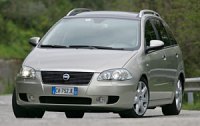 Remember
Croma ? 20 years ago Fiat joined project “Type 4” with Lancia,
Alfa Romeo and Saab. Based on the same platform, they developed
Lancia Thema, Saab 9000, Fiat Croma and Alfa Romeo 164. The Croma was
a big car to Fiat as well as to Italian. You know, the country used
to be dominated by Vespa and small cars like Fiat Uno and Panda. It
taxed cars over 2000 cc like luxurious cars. However, the Italian
found Fiat Croma was not only spacious and practical but also
affordable. It was affordable because Fiat made its body from just
321 components, 30% fewer than ordinary cars. High level of robotized
manufacturing also helped raising production efficiency. On the other
hand, its turbocharged 2-litre four-pot engine escaped from heavy tax
penalty while
providing sufficient punch. The Croma was designed by
Giugiaro, so it was pretty outside and spacious inside. While it
looked like a 3-box, it was actually a practical 5-door hatchback.
With all these good attributes, no wonder it immediately became the
national big car. It was used commonly as government official
transports, police cars and executive cars for those could not afford
import products. Remember
Croma ? 20 years ago Fiat joined project “Type 4” with Lancia,
Alfa Romeo and Saab. Based on the same platform, they developed
Lancia Thema, Saab 9000, Fiat Croma and Alfa Romeo 164. The Croma was
a big car to Fiat as well as to Italian. You know, the country used
to be dominated by Vespa and small cars like Fiat Uno and Panda. It
taxed cars over 2000 cc like luxurious cars. However, the Italian
found Fiat Croma was not only spacious and practical but also
affordable. It was affordable because Fiat made its body from just
321 components, 30% fewer than ordinary cars. High level of robotized
manufacturing also helped raising production efficiency. On the other
hand, its turbocharged 2-litre four-pot engine escaped from heavy tax
penalty while
providing sufficient punch. The Croma was designed by
Giugiaro, so it was pretty outside and spacious inside. While it
looked like a 3-box, it was actually a practical 5-door hatchback.
With all these good attributes, no wonder it immediately became the
national big car. It was used commonly as government official
transports, police cars and executive cars for those could not afford
import products.
Nevertheless,
after 450,000 cars built between 1985 and 1994, the curtain finally
fell down. As Fiat group tried to push Lancia and Alfa Romeo
upmarket, while Saab went into the hands of GM, Fiat did not have
enough partners to make the development and production of Croma Mk2
feasible. As a result, the Fiat large car disappeared from price list
for a whole decade. About 3 years ago, the project was revived as it
finally found a partner to share costs: General Motors. During the
short-lived merger between Fiat and GM (2000-2005), the two companies
agreed to develop cars based on the same platforms. The first fruit
is what they called the Fiat “New Large”, which is now known as
the second generation Croma.
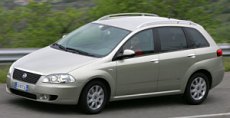 The
new Croma was derived from the Opel Vectra platform. This means its
sister cars include also Opel Signum, Saab 9-3, Chevrolet Malibu /
Maxx and Pontiac G6. This platform is available in 3 different
wheelbases – 2700mm (Vectra and Malibu), 2830mm (Signum) and 2852mm
(Maxx and G6). The new Croma chose the shortest of them, though it is
already longer than the original Croma by 40mm. Like others, it
employs strut and multi-link suspensions, electro-hydraulic steering
and a pretty stiff chassis with 17600Nm/degree torsional rigidity. The
new Croma was derived from the Opel Vectra platform. This means its
sister cars include also Opel Signum, Saab 9-3, Chevrolet Malibu /
Maxx and Pontiac G6. This platform is available in 3 different
wheelbases – 2700mm (Vectra and Malibu), 2830mm (Signum) and 2852mm
(Maxx and G6). The new Croma chose the shortest of them, though it is
already longer than the original Croma by 40mm. Like others, it
employs strut and multi-link suspensions, electro-hydraulic steering
and a pretty stiff chassis with 17600Nm/degree torsional rigidity.
What
made the difference is packaging. Once again, Giorgetto Giugiaro was
responsible for the styling. Instead of a conventional sedan, he
decided to create a crossover between estate and MPV. The Croma has a
fat, volume profile, very tall (1600mm) height, which exceeds a BMW 3-Series by 170mm ! The benefit
is of course a spacious cabin and a
fashionable high sitting position which delivers a commanding view.
From function point of view, the design works flawlessly.
However,
from styling point of view it is a nightmare. I am very disappointed
with Giugiaro this time. Perhaps he got accustomed to the mediocre
designs he delivered to Korean car makers in recent years, he is no
longer capable of designing beautiful Fiats. The uncharacteristic
shape, the dull grille, ugly headlights... everything points to a
Korean car. Remember the magics Giugiaro did to Panda, Uno, Croma
Mk1and Punto Mk1 ? Can you believe the same designer styled this
Croma Mk2 ? Poor Fiat, all bad luck happened to it at the same time:
sales crisis, lost of GM's partnership and the reliance on an
off-form Giugiaro.
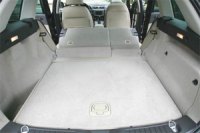 Anyway,
the cabin is highly spacious and practical. There is a lot more
passenger room than Opel Vectra. Even when the front seats are in
their rearmost position, rear passengers enjoy plenty of legroom. The
high-mounted seats allow more natural sitting position, thus Croma is
good companion to take the whole family for weekend long journey.
They will also find the car capable of carrying a lot of luggage -
500 litres in normal form and 1610 litres when the rear seats fold
down. What a pity they do not fold completely flat onto the floor. Anyway,
the cabin is highly spacious and practical. There is a lot more
passenger room than Opel Vectra. Even when the front seats are in
their rearmost position, rear passengers enjoy plenty of legroom. The
high-mounted seats allow more natural sitting position, thus Croma is
good companion to take the whole family for weekend long journey.
They will also find the car capable of carrying a lot of luggage -
500 litres in normal form and 1610 litres when the rear seats fold
down. What a pity they do not fold completely flat onto the floor.
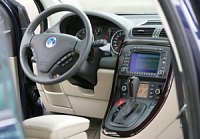 The
cabin has a lot of big storage spaces, such as a 11-litre glovebox
and a 3-litre drink cooler under the front arm rest. The dashboard is
clear but material quality is just average - Fiat learned a lesson
from the high-quality but slow-selling Stilo, so this time simply
save the money. A useful feature is a MPV-style, high-mounted gear
lever, which eases gearshift. Unfortunately, the relation between
steering wheel and pedals is typical Italian-style (long arms / short
legs), thus a comfortable driving position is difficult to find. The
cabin has a lot of big storage spaces, such as a 11-litre glovebox
and a 3-litre drink cooler under the front arm rest. The dashboard is
clear but material quality is just average - Fiat learned a lesson
from the high-quality but slow-selling Stilo, so this time simply
save the money. A useful feature is a MPV-style, high-mounted gear
lever, which eases gearshift. Unfortunately, the relation between
steering wheel and pedals is typical Italian-style (long arms / short
legs), thus a comfortable driving position is difficult to find.
Start
the engine, you will be pleased with the 150hp 1.9-litre 16V
common-rail JTD diesel engine. It is one of the most refined and
quiet diesel engines in the class, plus a bonus of remarkable power
and torque. It proves that Fiat is not struggling in all fields. At
least it is leading in diesel technology. At launch, the 1.9 JTD is
the fastest Croma, but it is still slower than the first generation
Croma turbo ie. Therefore later this year Fiat will give it a new
200hp, 2.4-litre JTD. It is basically a 5-pot version of the 1.9 JTD.
This is the fastest diesel of the class and should be a strong reason
to consider Croma.
In
the petrol side, Fiat is less enthusiastic. At the bottom end it
provides a 140hp 1.8-litre 16V engine, which is an old engine but
recently added with dual VVT (previously only at intake side). We
used to love this engine for its eager manner. Another engine is GM's
L850 2.2-litre 16V, which is not as rev-happy but delivers more
torque. However, the additional torque has to deal with another 80 kg
of weight, thus performance gain is rather slim. In fact, all Cromas
are heavyweight machines (see specification table below), therefore
the torquey diesel engines are better bet.
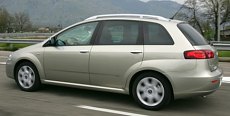 The
Croma drives very much like its platform donor Opel Vectra. It grips,
corners and stops competently, control its tall body surprisingly
well. But like Vectra, it is not very inspiring to drive. It lacks
the sharpness of Ford Mondeo and the neutrality of Peugeot 407. Its
steering delivers little feel. The
Croma drives very much like its platform donor Opel Vectra. It grips,
corners and stops competently, control its tall body surprisingly
well. But like Vectra, it is not very inspiring to drive. It lacks
the sharpness of Ford Mondeo and the neutrality of Peugeot 407. Its
steering delivers little feel.
As
for refinement, its revised springs, dampers and bushings deliver a
slightly more supple ride than Vectra, but it does not isolate noise
and harshness as well as the new Volkswagen Passat. The smoothness
and quietness of the JTD engine compensates a little, but not enough
to challenge the VW for overall refinement.
Anyway,
no one expect the MPV-style Croma to deliver a sporty driving
character, nor anyone expect a Fiat to match Volkswagen in quality
and refinement. The problem is, building another average car is
unlikely to pull Fiat out of its financial trouble. Fiat needs a hit
desperately. It has to be pretty and desirable, not a car looking
that dull. Time is running out for the Italian giant. |
| The
above report was last updated on 25 May
2005. All Rights Reserved. |
2008 facelift
|
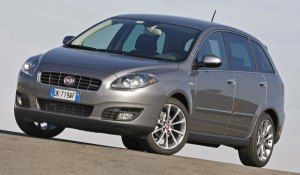
In late 2007 FIAT Croma received a facelift. New front grille and
headlights look nicer than the old car. There are also some trims and
equipment upgrade, but mechanically the car remained largely as before.
The old GM 2.2 petrol engine phased out without replacement. Other
engines continued without changes.
|
| The
above report was last updated on 15 Aug 2009. All Rights Reserved. |
|
|